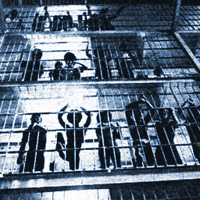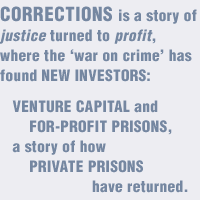|
 |
|
At a time when the U.S. has achieved the highest rate of imprisonment in the world, at a cost of $55 billion a year, and with statistics that tell us:
|
||
 |
Yet, while the U.S. public is witnessing an unfolding crisis of MASS IMPRISONMENT, more and more visible to us each day, this crisis has meant booming profits for a growing number of politicians, corporations, government agencies and unions, where we find increasing political and economic pressure to push the crisis further — far beyond what ideas of "safety" and "justice" would seem to demand. CORRECTIONS is a story of profits and mass imprisonment: how the histories of racial and economic inequality in the U.S. are emerging today from the walls of its prisons, and how this crisis has formed the incentive, profit and resource base for an entire industry. Where the "Tough-on-Crime" movement meets the ending of welfare, globalization, finance capital and neo-liberal policy, and today, the "war on terrorism."** CORRECTIONS explores how prisons have fast become the accepted solution to unemployment and housing crises, crumbled schools, livable wages without credit and the undoing of the Western Social Contract, set within the scene of collapsed rural economies and the "urban decay" of potentially expensive neighborhoods. |
|
CORRECTIONS takes you to:
|
 |
|
Featuring stories of the leading correctional corporations, testimony from the world's leading experts and the lives of ordinary people, CORRECTIONS takes audiences behind the walls of the prison system that Wall Street has called a "growth industry." |
||
